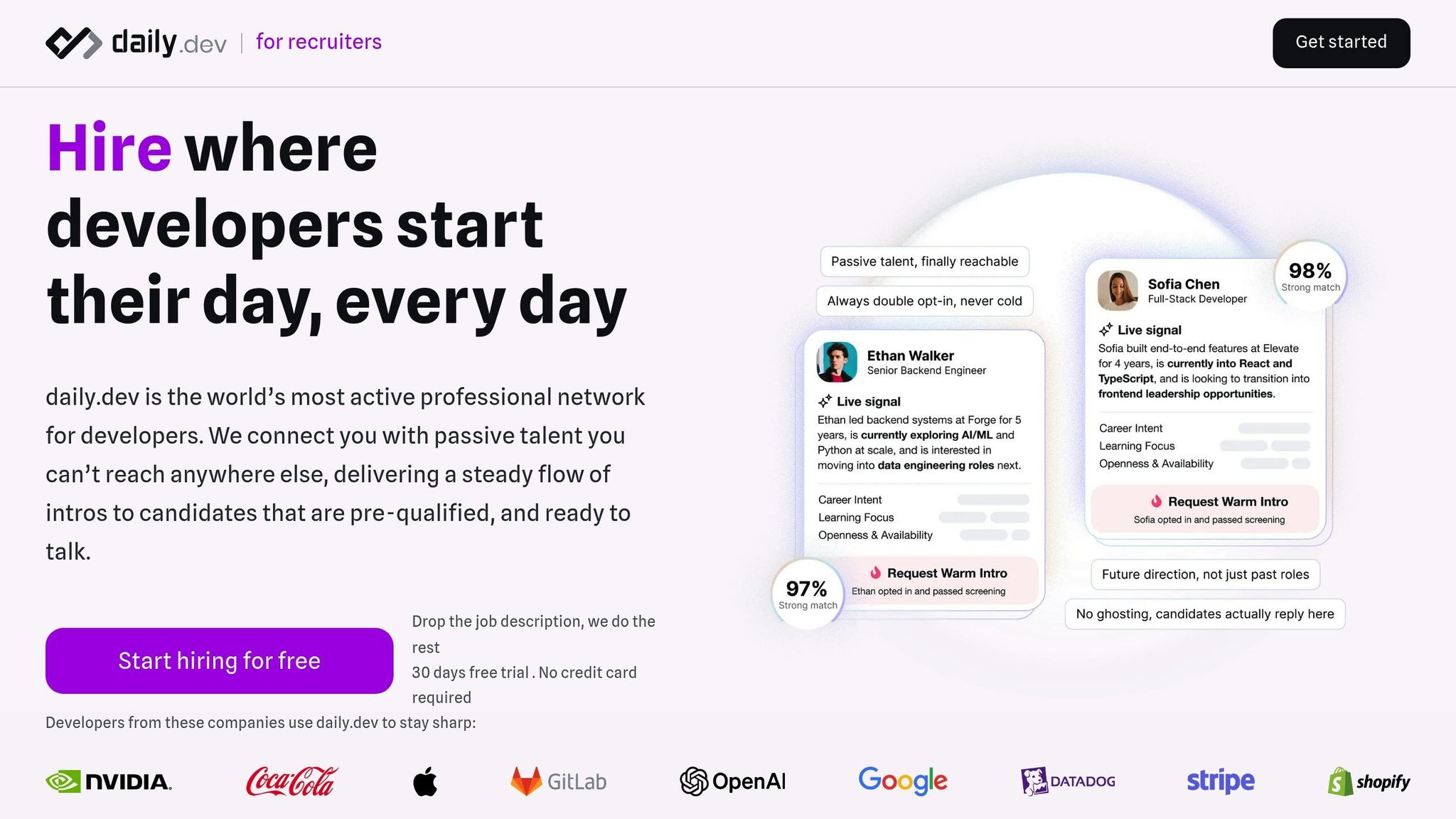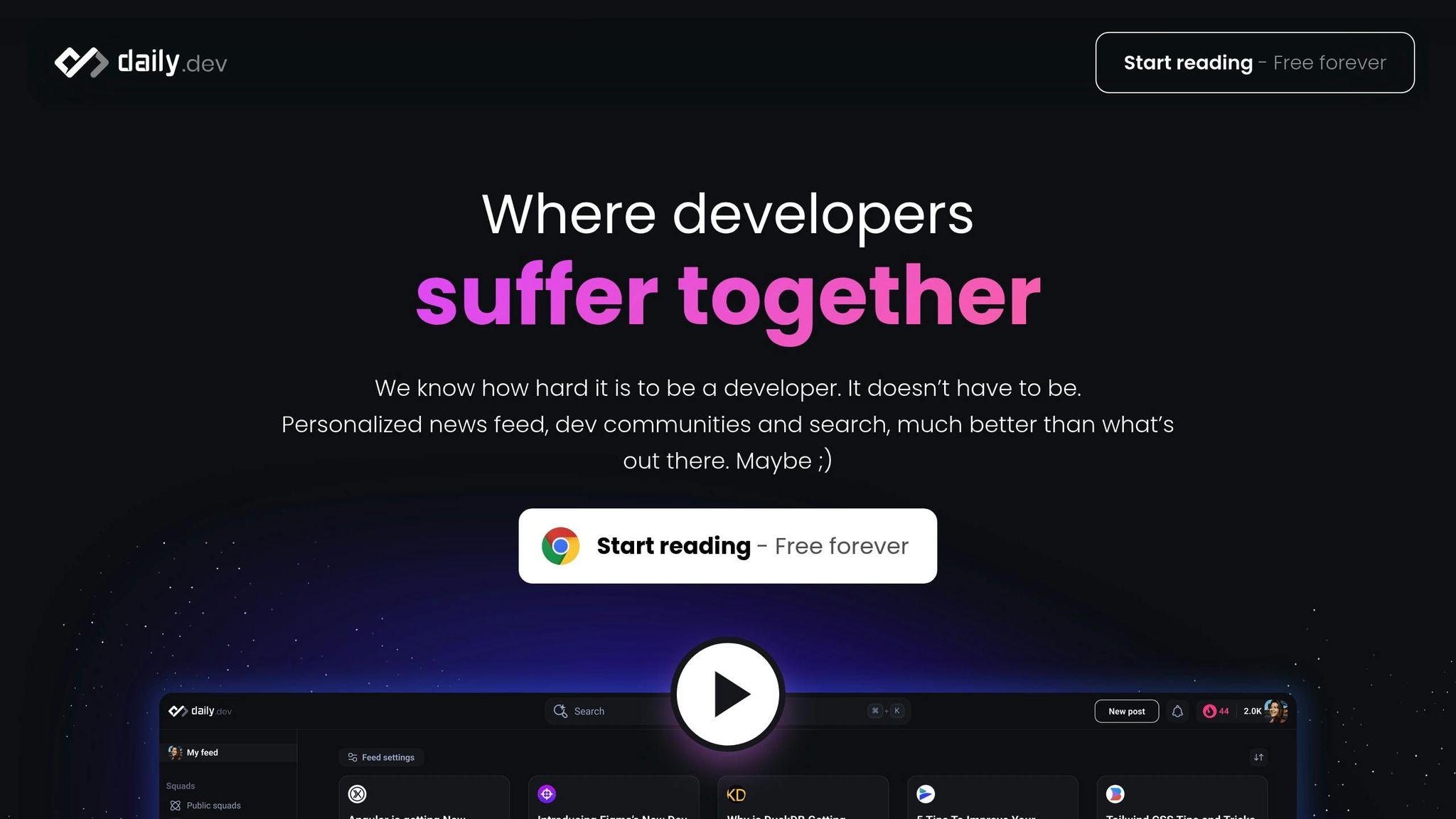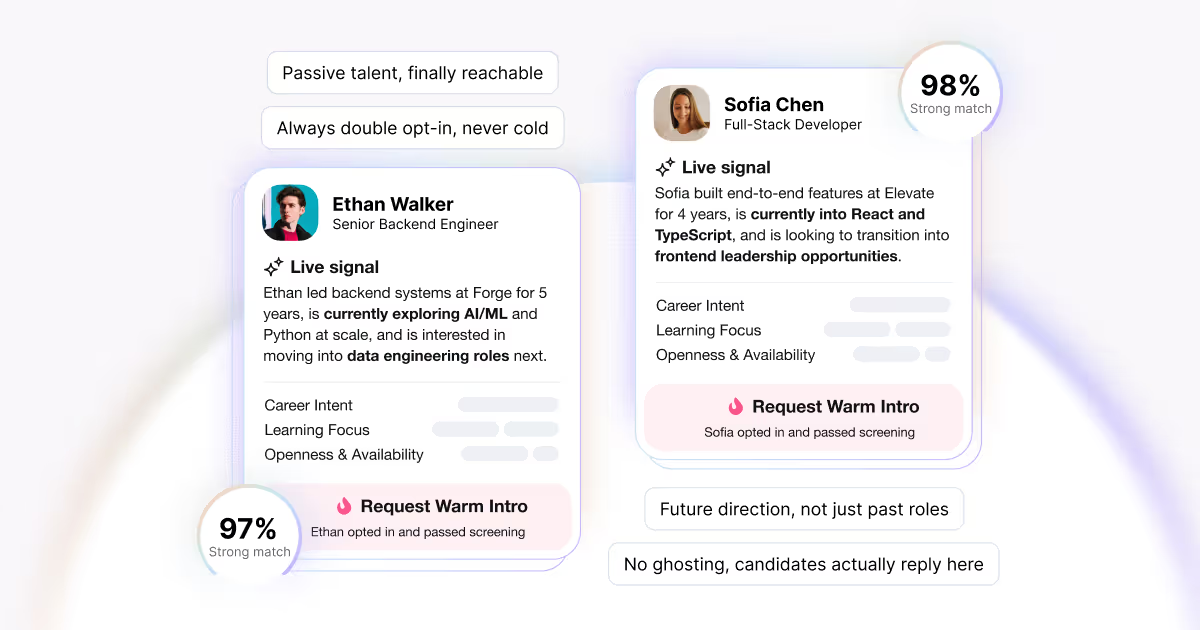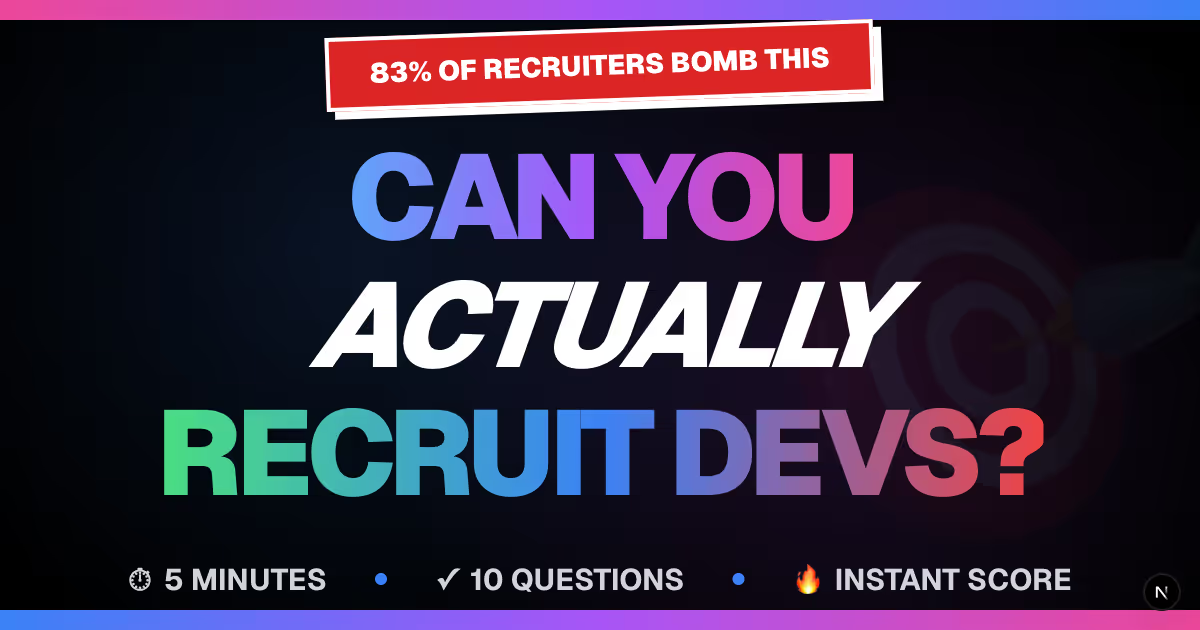


Explore the differences between job boards and developer networks in hiring, highlighting personalized connections and better talent quality.
Finding developers is tough. Most aren’t actively job hunting, and traditional methods like job boards often fail to connect with top talent. Developers prioritize roles with engaging tech stacks, meaningful projects, and strong team dynamics over generic perks or salaries. Recruitment strategies need to address these preferences and reach developers where they already are.
Key Takeaways:
- Job Boards: Broad reach but rely on keyword matching, leading to mixed-quality candidates and impersonal processes.
- Developer Networks: Focused on community engagement, offering better insights into skills, access to passive talent, and more relevant matches.
Quick Comparison:
| Feature | Job Boards | Developer Networks |
|---|---|---|
| Matching Method | Keyword-based | Context and behavior-based |
| Candidate Quality | High volume, mixed fit | Pre-qualified talent |
| Access to Passive Talent | Minimal | Strong |
| Personalization | Limited | High |
For companies serious about hiring skilled developers, developer networks offer a better path by connecting with engaged talent and fostering meaningful hiring conversations.
Job Boards: Wide Reach, Limited Customization
Job boards are a go-to option for casting a wide net when posting job openings and gathering applications. They make it easy to reach active job seekers, but their approach to hiring developers comes with notable limitations that can impact the quality of recruitment efforts.
How Job Boards Work
Most traditional job boards rely on standardized templates and keyword-driven applicant tracking systems (ATS) to attract candidates. Recruiters can sift through countless resumes by searching for terms like "React", "Python", or "machine learning." The platforms' algorithms then rank candidates based on how closely their profiles match the chosen keywords.
However, the process is often one-sided. Developers typically submit their resumes and cover letters through forms, with little to no interaction with hiring managers early on. This transactional setup means there's little room to explore the deeper needs and interests of both parties, creating a disconnect.
Why Job Boards Fall Short for Developer Hiring
The biggest issue with job boards is their generalized approach. These platforms aim to attract as many candidates as possible, but this broad strategy often overlooks the specific skills or nuanced requirements that companies are looking for. As a result, companies may find themselves wading through applications that don't quite fit their needs.
Over-reliance on keywords only makes matters worse. ATS systems are designed to filter candidates based on exact matches, which means a talented developer could be passed over simply because they describe their experience differently. For example, someone might write "building web applications" instead of listing specific frameworks by name, and the system wouldn't flag them as a match.
This impersonal process also makes it harder to assess whether a candidate aligns with a company's values or work environment. The algorithms prioritize keyword matches over meaningful connections, which can lead to high-quality candidates being overlooked in favor of those who have optimized their profiles for the system.
In contrast, developer networks take a more personalized, community-driven approach - something that job boards struggle to replicate. This alternative method is explored in the next section.
Developer Networks: Community-Based, Interest-Focused Hiring
Developer networks are changing the game when it comes to hiring in tech. Instead of the broad, impersonal reach of job boards, these platforms focus on fostering genuine connections within professional communities where developers are already active. Let’s dive into what makes these networks so distinct.
What Are Developer Networks?
Developer networks are specialized communities designed for engineers to share knowledge, collaborate, and grow professionally. Unlike traditional job boards that only serve as static listings, these networks are dynamic spaces where developers engage in discussions, contribute to projects, and stay updated on industry trends.
What sets these networks apart is their alignment with developers' specific interests and professional goals. These communities come in different forms, such as technical forums, open-source project hubs, or platforms like daily.dev, where developers not only consume content but also actively participate in conversations and build their professional presence. Developers join these networks not to hunt for jobs but to grow and connect, which creates a more organic and authentic environment.
The beauty of developer networks lies in their natural structure. Developers showcase their skills, interests, and goals through their contributions, making these platforms a rich source of insights for recruiters.
Benefits of Developer Networks for Recruitment
The community-driven nature of developer networks brings several advantages that address the shortcomings of traditional job boards. Here’s why they matter for hiring:
- Deeper Insights into Talent: By observing how developers solve problems, engage in discussions, or contribute to projects, recruiters gain a clearer picture of their skills and interests - far beyond what a résumé or cover letter can reveal.
- Access to Passive Talent: Many top developers aren’t actively job hunting but are open to the right opportunity when it comes from a trusted space. These passive candidates often bring specialized skills and experience, making them highly sought after. However, they’re less likely to respond to cold outreach or browse job boards, which makes developer networks a perfect way to connect with them.
- Values Alignment: In today’s job market, alignment with company values is crucial. A survey found that 56% of employees wouldn’t consider working for a company if they disagreed with its values. Developer networks offer a chance to naturally attract candidates whose values align with the company’s mission, strengthening employer branding and making hiring smoother.
- Building Trust and Credibility: Companies that actively participate in these communities - whether by sharing valuable content, answering questions, or supporting projects - build trust and establish themselves as thought leaders. This credibility makes them more attractive to developers, often leading to long-term interest and engagement before specific hiring needs even arise.
When companies engage authentically in developer networks, they often find that developers approach them directly - whether for job opportunities, referrals, or future roles. This transforms recruitment from a transactional process into an ongoing, relationship-driven effort that delivers long-term benefits.
Unlike the cold, keyword-driven approach of job boards, developer networks enable warm, contextual introductions. When a developer shows interest in a role within a network where they’re already active, the conversation begins with shared context and mutual interest. This naturally leads to more meaningful hiring discussions and tailored opportunities, creating a win-win for both sides.
Customizing Job Opportunities: Job Boards vs. Developer Networks
When it comes to matching developers with job opportunities, the difference between job boards and developer networks lies in how tailored the process is. Job boards take a broad approach, offering limited customization, while developer networks focus on creating precise matches by understanding individual skills and preferences on a deeper level.
Job boards primarily use keyword matching, which often results in generic and overwhelming lists of opportunities. For example, a Java developer might see dozens of listings simply because "Java" appears in the job description - ignoring the fact that responsibilities can vary dramatically between roles. This lack of specificity can frustrate both recruiters and candidates.
Developer networks, on the other hand, take a more refined approach. Using advanced algorithms that consider context, behavior, and engagement, they go beyond keywords. These platforms analyze how developers interact with content, the technologies they follow, and the discussions they participate in. By evaluating skills, interests, and even cultural alignment, developer networks provide matches that feel more intentional and relevant. This approach benefits both recruiters and candidates, ensuring a better fit for both sides.
To break it down further, here's a side-by-side comparison of the key metrics:
Comparison Table: Main Metrics
| Factor | Job Boards | Developer Networks |
|---|---|---|
| Matching Method | Keyword-based algorithms | Context-aware and behavioral analysis |
| Personalization Level | Basic filters (e.g., location, salary) | Detailed profiling of skills and interests |
| Candidate Quality | High volume, mixed relevance | Pre-qualified, curated talent pool |
| Application Relevance | Often lower relevance | Highly relevant applications |
| Recruiter Efficiency | Time-consuming screening required | Streamlined with pre-filtered candidates |
| Developer Experience | Generic, impersonal alerts | Tailored and engaging opportunities |
| Cultural Fit Assessment | Limited to standard job descriptions | Enhanced through community engagement |
| Passive Talent Access | Minimal reach to passive candidates | Strong connection with passive talent |
| Time to Quality Match | Slower to find the right fit | Faster matches with suitable candidates |
One standout feature of developer networks is their ability to facilitate "warm introductions." These platforms ensure that both the recruiter and the candidate show genuine interest before connecting, leading to more productive and engaging conversations.
For recruiters, this tailored approach saves time by reducing the need for extensive screening and enabling direct, meaningful interactions. By focusing on quality over quantity, developer networks help cut down on misaligned interviews and speed up the hiring process.
sbb-itb-d1e6221
daily.dev Recruiter: A Developer-First Hiring Solution

daily.dev Recruiter takes a fresh approach to hiring by bridging the gap between traditional job boards and developer networks. It addresses the impersonal nature of job boards and the limited flexibility of networks, offering a platform designed with developers in mind. Built on a thriving community of engaged software engineers, it creates a hiring space that emphasizes connection and delivers meaningful results for recruiters.
The idea is simple yet effective: connect employers with developers where they’re already active. Instead of pushing developers into yet another job search platform, daily.dev Recruiter integrates into their existing professional environment. This reduces the noise and inefficiency often associated with traditional recruiting methods, creating a smoother and more natural hiring experience.
What makes daily.dev Recruiter stand out is its unique approach. It doesn’t rely on outdated resumes or scraped profiles. Instead, it taps into real-time developer engagement, giving recruiters access to a pool of passive, pre-qualified talent - developers who are actively involved in their field and staying current with the latest technologies.
How daily.dev Recruiter Works

At its core, the platform uses warm, double opt-in introductions to ensure that both recruiters and developers are genuinely interested before any interaction begins. When a recruiter posts a job, the system uses advanced targeting to identify developers whose skills and interests align with the role. Instead of overwhelming developers with generic job alerts, daily.dev Recruiter provides developer-friendly role briefs that highlight technical challenges, growth potential, and company culture.
The double opt-in process ensures that connections are meaningful, with both parties opting in before communication starts. Additionally, recruiters can set custom screening criteria, such as specific technical skills or experience levels, to ensure that only the most relevant candidates are introduced. This focused approach minimizes wasted effort and maximizes productive conversations.
Benefits for Recruiters and Developers
For recruiters, daily.dev Recruiter offers a more efficient and effective hiring process. By connecting with pre-qualified talent and leveraging the double opt-in system, recruiters can skip the time-consuming outreach that often goes nowhere and focus on meaningful interactions. The result? Higher response rates and better hiring outcomes.
Developers, on the other hand, benefit from a process tailored to their needs and preferences. They aren’t bombarded with irrelevant job offers, and roles are presented in a way that respects their time and expertise. Plus, the platform’s transparent pricing model eliminates hidden fees, creating trust and clarity for all parties involved.
Another major advantage is access to a global network of developers. For companies aiming to hire remote talent or expand their search beyond local markets, daily.dev Recruiter opens doors to hard-to-reach talent pools. The entire process is designed to maintain a positive candidate experience, ensuring that developers feel valued and respected. This not only reflects well on the hiring companies but also strengthens the developer community as a whole.
Conclusion: Choosing the Right Method for Developer Hiring
When it comes to hiring developers, the decision often boils down to a choice between casting a wide net or focusing on quality connections. Job boards, while offering access to a large pool of candidates, often lead to inconsistent results. Employers must sift through countless profiles, many of which lack thorough screening, resulting in a time-consuming and competitive process. On the other hand, developer networks prioritize connecting employers with pre-vetted talent, making the hiring process smoother and more reliable.
One major drawback of job boards is their reliance on self-reported profiles and reviews, which can vary greatly in accuracy. In contrast, developer networks conduct rigorous assessments and use human-analyzed matching to ensure candidates meet high standards. This significantly reduces the guesswork involved in recruitment.
Another key advantage of developer networks is their ability to provide deeper insights into a candidate's skills and work ethic. Recruiters can review actual code, completed projects, and collaboration history - offering tangible proof of a candidate's abilities. Job boards, however, typically rely on resumes and cover letters, which might not fully reflect practical skills or teamwork capabilities.
Personalization also plays a critical role. Developer networks excel in tailoring matches through human analysis, creating meaningful connections that consider both technical expertise and workplace compatibility. This personalized approach is especially valuable for technical roles, where finding the right fit can make a huge difference in long-term success.
For companies aiming to hire top-tier developer talent, developer networks clearly stand out as the better option. They cut through the inefficiencies of traditional job boards by fostering trust-based connections with engaged professionals. The result? Higher-quality hires, faster placements, and improved retention rates.
A prime example of this approach is daily.dev Recruiter, which seamlessly integrates into developers' professional environments. By focusing on relationship-building rather than transactional hiring, it transforms the recruitment process into one that benefits both employers and developers alike.
FAQs
Why are developer networks better than job boards for hiring developers?
Developer networks provide a distinct edge by linking you with active, passive talent already participating in a trusted community. This opens the door to genuine, engaging conversations with developers who are open to exploring opportunities that align with their interests, eliminating the need for impersonal cold outreach.
Compared to traditional job boards, which often bring in a wide range of less-targeted candidates, developer networks prioritize quality connections. This means less time spent sifting through applications and more time having productive interactions, streamlining the hiring process while building trust along the way.
Why are developer networks valuable for finding top talent, especially passive candidates?
Developer networks are a fantastic way to connect with passive talent - those skilled professionals who aren’t actively job hunting but might be tempted by the right opportunity. These platforms are where developers naturally spend their time, whether they’re learning, collaborating, or sharing their expertise. By reaching out in spaces where they already feel comfortable, recruiters can build genuine connections and establish trust.
Why does this matter? Passive candidates are often seasoned professionals who don’t rely on traditional job boards to find opportunities. Engaging with them through developer networks not only broadens your talent pool but also boosts your chances of discovering top-notch hires who are the perfect fit for your team.
How can companies establish trust and credibility to attract top developers through professional networks?
To earn trust and build credibility within developer communities, companies should prioritize transparency and genuine communication. By sharing meaningful updates - whether about job openings, company culture, or core values - you create a sense of integrity that resonates with developers. This openness helps them feel respected and valued.
Another key factor is developing a strong employer brand that emphasizes equity, employee well-being, and a supportive workplace. When you consistently engage with developers and focus on building authentic, lasting relationships, your outreach feels more personal, which naturally strengthens trust and credibility.
Related Blog Posts








